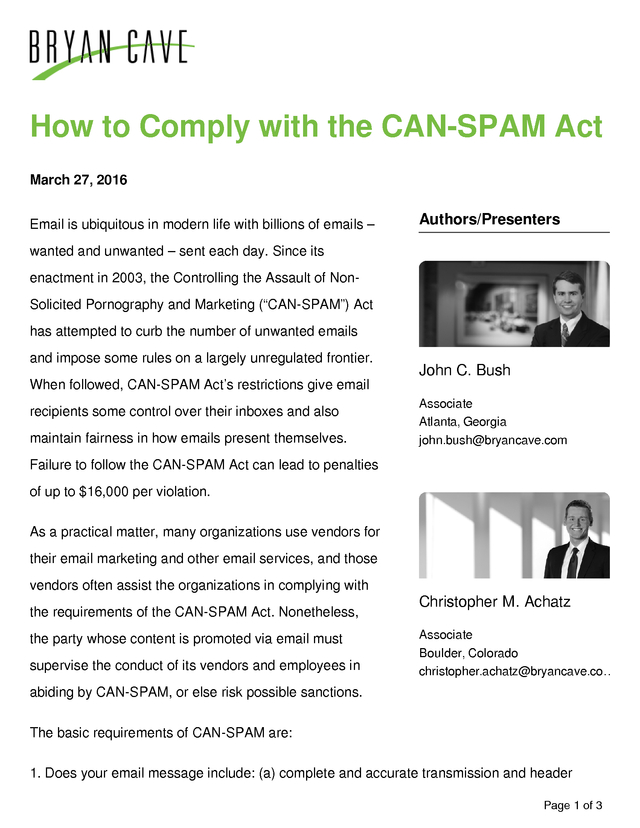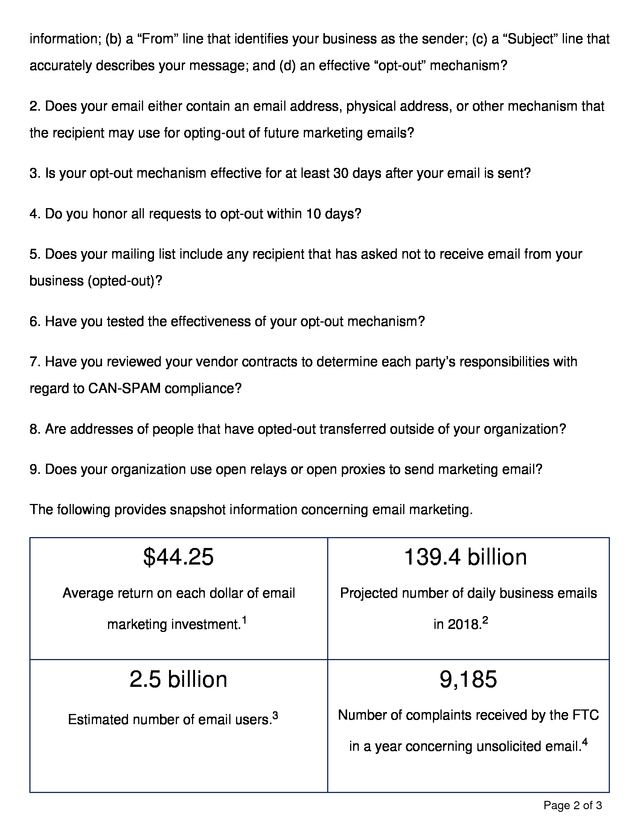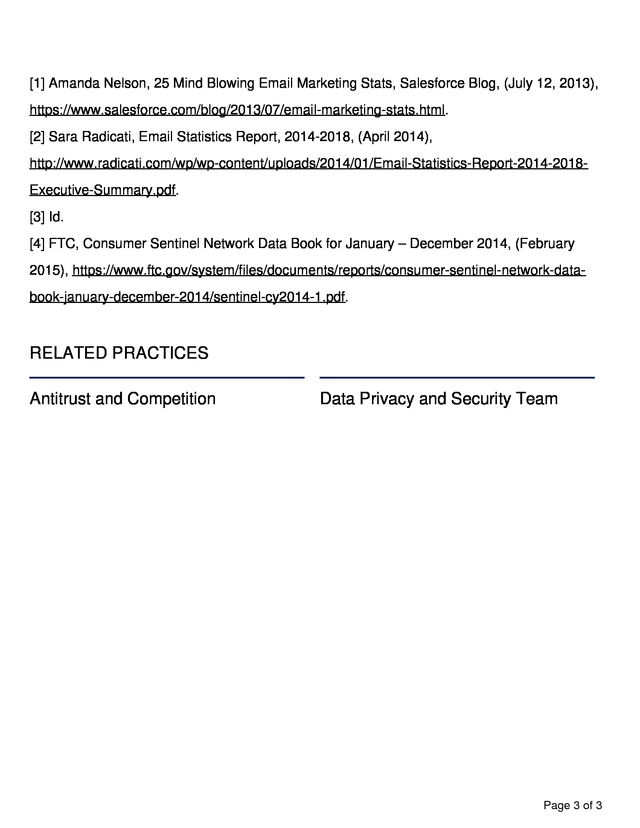Description
How to Comply with the CAN-SPAM Act
March 27, 2016
Email is ubiquitous in modern life with billions of emails –
Authors/Presenters
wanted and unwanted – sent each day. Since its
enactment in 2003, the Controlling the Assault of NonSolicited Pornography and Marketing (“CAN-SPAM”) Act
has attempted to curb the number of unwanted emails
and impose some rules on a largely unregulated frontier.
When followed, CAN-SPAM Act’s restrictions give email
recipients some control over their inboxes and also
maintain fairness in how emails present themselves.
John C. Bush
Associate
Atlanta, Georgia
john.bush@bryancave.com
Failure to follow the CAN-SPAM Act can lead to penalties
of up to $16,000 per violation.
As a practical matter, many organizations use vendors for
their email marketing and other email services, and those
vendors often assist the organizations in complying with
the requirements of the CAN-SPAM Act. Nonetheless,
the party whose content is promoted via email must
supervise the conduct of its vendors and employees in
Christopher M.
Achatz Associate Boulder, Colorado christopher.achatz@bryancave.co… abiding by CAN-SPAM, or else risk possible sanctions. The basic requirements of CAN-SPAM are: 1. Does your email message include: (a) complete and accurate transmission and header Page 1 of 3 . information; (b) a “From” line that identifies your business as the sender; (c) a “Subject” line that accurately describes your message; and (d) an effective “opt-out” mechanism? 2. Does your email either contain an email address, physical address, or other mechanism that the recipient may use for opting-out of future marketing emails? 3. Is your opt-out mechanism effective for at least 30 days after your email is sent? 4. Do you honor all requests to opt-out within 10 days? 5.
Does your mailing list include any recipient that has asked not to receive email from your business (opted-out)? 6. Have you tested the effectiveness of your opt-out mechanism? 7. Have you reviewed your vendor contracts to determine each party’s responsibilities with regard to CAN-SPAM compliance? 8.
Are addresses of people that have opted-out transferred outside of your organization? 9. Does your organization use open relays or open proxies to send marketing email? The following provides snapshot information concerning email marketing. $44.25 139.4 billion Average return on each dollar of email Projected number of daily business emails marketing investment.1 2.5 billion Estimated number of email users.3 in 2018.2 9,185 Number of complaints received by the FTC in a year concerning unsolicited email.4 Page 2 of 3 . [1] Amanda Nelson, 25 Mind Blowing Email Marketing Stats, Salesforce Blog, (July 12, 2013), https://www.salesforce.com/blog/2013/07/email-marketing-stats.html. [2] Sara Radicati, Email Statistics Report, 2014-2018, (April 2014), http://www.radicati.com/wp/wp-content/uploads/2014/01/Email-Statistics-Report-2014-2018Executive-Summary.pdf. [3] Id. [4] FTC, Consumer Sentinel Network Data Book for January – December 2014, (February 2015), https://www.ftc.gov/system/files/documents/reports/consumer-sentinel-network-databook-january-december-2014/sentinel-cy2014-1.pdf. RELATED PRACTICES Antitrust and Competition Data Privacy and Security Team Page 3 of 3 .
Achatz Associate Boulder, Colorado christopher.achatz@bryancave.co… abiding by CAN-SPAM, or else risk possible sanctions. The basic requirements of CAN-SPAM are: 1. Does your email message include: (a) complete and accurate transmission and header Page 1 of 3 . information; (b) a “From” line that identifies your business as the sender; (c) a “Subject” line that accurately describes your message; and (d) an effective “opt-out” mechanism? 2. Does your email either contain an email address, physical address, or other mechanism that the recipient may use for opting-out of future marketing emails? 3. Is your opt-out mechanism effective for at least 30 days after your email is sent? 4. Do you honor all requests to opt-out within 10 days? 5.
Does your mailing list include any recipient that has asked not to receive email from your business (opted-out)? 6. Have you tested the effectiveness of your opt-out mechanism? 7. Have you reviewed your vendor contracts to determine each party’s responsibilities with regard to CAN-SPAM compliance? 8.
Are addresses of people that have opted-out transferred outside of your organization? 9. Does your organization use open relays or open proxies to send marketing email? The following provides snapshot information concerning email marketing. $44.25 139.4 billion Average return on each dollar of email Projected number of daily business emails marketing investment.1 2.5 billion Estimated number of email users.3 in 2018.2 9,185 Number of complaints received by the FTC in a year concerning unsolicited email.4 Page 2 of 3 . [1] Amanda Nelson, 25 Mind Blowing Email Marketing Stats, Salesforce Blog, (July 12, 2013), https://www.salesforce.com/blog/2013/07/email-marketing-stats.html. [2] Sara Radicati, Email Statistics Report, 2014-2018, (April 2014), http://www.radicati.com/wp/wp-content/uploads/2014/01/Email-Statistics-Report-2014-2018Executive-Summary.pdf. [3] Id. [4] FTC, Consumer Sentinel Network Data Book for January – December 2014, (February 2015), https://www.ftc.gov/system/files/documents/reports/consumer-sentinel-network-databook-january-december-2014/sentinel-cy2014-1.pdf. RELATED PRACTICES Antitrust and Competition Data Privacy and Security Team Page 3 of 3 .















